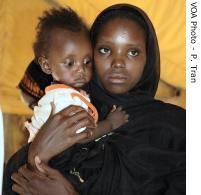2007年VOA标准英语-UNHCR Calls on Sudan to Recognize Refugees From
搜索关注在线英语听力室公众号:tingroom,领取免费英语资料大礼包。
(单词翻译)
By Lisa SchleinGeneva
07 August 2007
The U.N. Refugee Agency (UNHCR) and the Sudanese Commissioner1 for Refugees are recommending that thousands of new arrivals from Chad who have crossed over to Darfur in recent months be recognized by the Sudanese government as refugees. In the most comprehensive assessment2 of the situation to date, the two agencies jointly4 say that these people have reason to fear for their safety if they are returned home. Lisa Schlein reports for VOA from UNHCR headquarters in Geneva.
 |
| Sudanese mother and child, Habile, Chad, 14 May 2007 |
The joint3 report says most of the new arrivals are Arab nomadic5 or semi-nomadic tribes, although some are from non-Arab tribes. UNHCR spokeswoman, Jennifer Pagonis, says the refugees come from settlements along the Chad-Sudan border.
"They said that they left their homes in Chad after armed men wearing military uniforms entered their homes searching for weapons and accused villagers of supporting and participating in militia6 activities," she said. "There was apparently7 violence, looting, and beatings, murders and in some cases rape8 committed by this group according to those who left."
Given these conditions, Pagonis says the UNHCR and Sudanese Commission believe these Chadians are eligible9 for refugee status, because their safety could be at stake if they were deported10.
But, she says it is agreed that refugee status should not be granted to active or former combatants who could be part of the group. The government of Chad has been fighting rebels in the eastern part of the country, near Sudan.
Pagonis notes that nomadic cross-border movements have existed for centuries in this region. She says nomads11 regularly move back and forth12 with their livestock13 seeking areas where water and grazing land are available.
And, she says, some of the new arrivals say the main reason they left Chad was because of scarce resources, especially water.
"However, the recent cross-border movements to Darfur are mainly motivated by insecurity in Eastern Chad at the end of last year and during the first part of this year," she added. "The UNHCR-COR (Commissioner for Refugees) report also mentions that on their arrival in West Darfur, some families reported having been directed by local Sudanese tribes men, or local Sudanese leaders to occupy empty land, especially in the Wadi Azoum and Wadi Saleh areas. The land belongs to people who are now displaced in camps in Darfur or refugees in eastern Chad."
Pagonis says the report urges the Sudanese Government to quickly clarify land ownership issues and make sure that the owners of the land, mainly internally displaced people in Darfur and refugees in Chad, will be able to return to their villages when they believe it is safe to do so.
The conflict in Darfur has uprooted14 about 2.5 million people. More than 200,000 have sought refuge in neighboring Chad.
 收听单词发音
收听单词发音 




